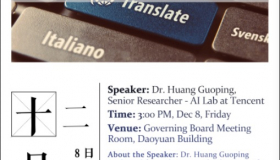Customer Capital, Markup Cyclicality, and Amplification
 |
||
|---|---|---|
|
Topic: |
Customer Capital, Markup Cyclicality, and Amplification |
|
|
Time & Date: |
10:30am-12:00pm, 2017/12/5 |
|
|
Venue: |
Room 502, Daoyuan Building, CUHK(SZ) |
|
|
Speaker: |
Sungki Hong, St. Louis Fed |
|
|
Detail: |
This paper studies the importance of firm-level price markup dynamics for business cycle fluctuations. The first part of the paper uses state-of-the-art IO techniques to measure the behavior of markups over the business cycle at the firm level. I find that markups are countercyclical with an average elasticity of -0.9 with respect to real GDP, in line with the earlier industry-level evidence. Importantly, I find substantial heterogeneity in markup cyclicality across firms, with small firms having significantly more countercyclical markups than large _rms. In the second part of the paper, I develop a general equilibrium model that matches these empirical findings and explore its implications for business cycle dynamics. In particular, I embed customer capital (due to deep habits as in Ravn, Schmitt-Grohe, and Uribe 2006) into a standard Hopenhayn (1992) model of firm dynamics with entry and exit. A key feature of the model is that a firm's decision about markups becomes dynamic { firms accumulate customer capital in the periods of fast growth by charging low markups, and choose to exploit it by charging high markups in the downturns. In particular, during recessions, the endogenous higher exit probability for smaller firms implies that they place lower weight on future profits, leading them to charge higher markups. This mechanism serves to endogenously increase the dispersion of firm sales and employment in recessions, a property that is consistent with the data. I further show that the resulting input misallocation amplifies both the volatility and persistence of the exogenous productivity shocks driving the business cycle.
|
|




